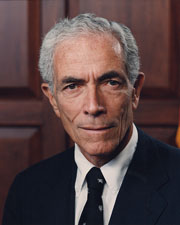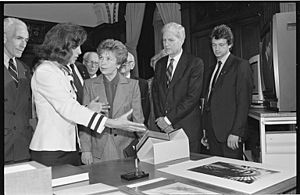Claiborne Pell facts for kids
Quick facts for kids
Claiborne Pell
GCC GCM
|
|
|---|---|

Official portrait of Pell
|
|
| Chair of the Senate Foreign Relations Committee | |
| In office January 3, 1987 – January 3, 1995 |
|
| Preceded by | Richard Lugar |
| Succeeded by | Jesse Helms |
| Chair of the Senate Rules Committee | |
| In office January 3, 1978 – January 3, 1981 |
|
| Preceded by | Howard Cannon |
| Succeeded by | Charles Mathias |
| United States Senator from Rhode Island |
|
| In office January 3, 1961 – January 3, 1997 |
|
| Preceded by | Theodore Green |
| Succeeded by | Jack Reed |
| Personal details | |
| Born |
Claiborne de Borda Pell
November 22, 1918 New York City, New York, U.S. |
| Died | January 1, 2009 (aged 90) Newport, Rhode Island, U.S. |
| Political party | Democratic |
| Spouse | Nuala O'Donnell |
| Children | 4 |
| Parent |
|
| Relatives | John Pell (ancestor) William C. C. Claiborne (great-great-great-granduncle) Clay Pell (grandson) |
| Education | Princeton University (AB) Columbia University (MA) |
| Signature | |
| Military service | |
| Allegiance | |
| Branch/service | |
| Years of service | 1941–1945 (active) 1945–1978 (reserve) |
| Rank | |
| Unit | United States Coast Guard Reserve |
| Battles/wars | World War II |
Claiborne de Borda Pell (November 22, 1918 – January 1, 2009) was an American politician and writer. He served as a U.S. Senator from Rhode Island for six terms, from 1961 to 1997. He is best known for creating the Pell Grant program. This program helps American college students pay for their education.
A member of the Democratic Party, Pell was the longest-serving U.S. Senator from Rhode Island.
Contents
Early Life and Education
Claiborne Pell was born on November 22, 1918, in New York City. His father, Herbert Pell, was a diplomat and congressman. Claiborne came from a family with a long history in the United States. His relatives included the English mathematician John Pell.
Claiborne attended St. George's School (Rhode Island) in Rhode Island. He then went to Princeton University, where he earned a degree in history in 1940. He also played on the rugby team there.
Life After College
After graduating from Princeton, Pell worked in an oil field in Oklahoma. He then became a private secretary for his father, who was the U.S. Ambassador to Portugal and later to Hungary. At the start of World War II, Claiborne Pell drove trucks carrying supplies to prisoners of war in Germany.
Military Service
Pell joined the U.S. Coast Guard on August 12, 1941. This was four months before the Attack on Pearl Harbor. He started as a seaman and quickly became an officer. During World War II, his ships helped protect convoys in the Atlantic Ocean. He also took part in important amphibious warfare landings in Sicily and Italy.
Pell was promoted to lieutenant in May 1943. Because he spoke Italian, he helped with civilian affairs in Sicily. He left active duty on September 5, 1945. After the war, he stayed in the U.S. Coast Guard Reserve. He reached the rank of captain before retiring in 1978.
Family Life
In December 1944, Pell married Nuala O'Donnell. They had four children together. His grandson, Clay Pell, later ran for Governor of Rhode Island.
Diplomatic Work and Further Studies
From 1945 to 1952, Pell worked for the United States Department of State. He served as a diplomat in Czechoslovakia, Italy, and Washington, D.C.. He was fluent in French, Italian, and Portuguese.
In 1945, Pell helped draft the United Nations Charter in San Francisco. In 1946, he earned a master's degree in International Relations from Columbia University.
Other Activities
After his diplomatic career, Pell held various leadership roles. He was a vice president for the International Fiscal Corporation and the North American Newspaper Alliance. He also helped raise money for the Democratic National Committee. He served as Vice President of the International Rescue Committee, helping refugees from the Hungarian Revolution of 1956.
Political Career
In 1960, Claiborne Pell won the election to become a U.S. Senator for Rhode Island. He took over the seat from the retiring Senator Theodore Francis Green. Pell was known for being a strong campaigner. He won reelection five times, serving a total of 36 years.
During his first campaign, some people said he was not truly from Rhode Island. Pell showed newspaper ads with a photo of his grand-uncle, Duncan Pell, who had been a Lieutenant Governor of Rhode Island. This showed his family's long connection to the state. He also used his language skills to connect with immigrant communities.
Pell Education Grants
Claiborne Pell is most famous for creating the "Basic Educational Opportunity Grants" in 1973. These grants provide money to U.S. college students who need financial help. In 1980, the grants were renamed Pell Grants in his honor.
He also played a key role in creating the National Endowment for the Arts and the National Endowment for the Humanities. These organizations support arts and culture in the United States.
Later Years in the Senate
Pell served as Chairman of the United States Senate Committee on Foreign Relations from 1987 to 1995. This committee deals with how the U.S. interacts with other countries. In 1990, he was re-elected for his sixth and final term.
Pell chose not to run for re-election in 1996 and retired on January 3, 1997. He was the longest-serving U.S. Senator in Rhode Island's history. Jack Reed succeeded him.
Retirement and Death
After retiring, Pell lived in Newport, Rhode Island. He was diagnosed with Parkinson's disease later in his life.
Claiborne Pell died on January 1, 2009. His funeral was held in Newport. Important figures like former President Bill Clinton and Senator Ted Kennedy spoke at his funeral. He was buried in Middletown, Rhode Island.
The New York Times newspaper called Pell "the most formidable politician in Rhode Island history" after his death.
Authorship and Recognition
Published Works
Senator Pell wrote three books:
- Megalopolis Unbound: The Supercity and the Transportation of Tomorrow (1966)
- A Challenge of the Seven Seas (1966) (co-authored)
- "Power and Policy: America's Role in World Affairs" (1972)
Awards and Honors
Senator Pell received over 50 honorary college degrees. In 1987, he was recognized by the United Nations Environment Programme. In 1988, he received the Foreign Language Advocacy Award.
On October 14, 1994, President Bill Clinton gave Pell the Presidential Citizens Medal.
Several places and institutions are named in his honor:
- The Claiborne Pell Newport Bridge in Rhode Island.
- The Pell Center of International Relations and Public Policy at Salve Regina University.
- The Claiborne Pell Elementary School in Newport, which opened in 2013.
He also received honors from other countries, including the French Legion of Honour and the Italian Order of the Crown of Italy.
His military awards from World War II included the American Defense Service Medal and the World War Two Victory Medal.
Honors
 Presidential Citizens Medal (1994)
Presidential Citizens Medal (1994) American Defense Service Medal
American Defense Service Medal American Campaign Medal
American Campaign Medal European-African-Middle Eastern Campaign Medal
European-African-Middle Eastern Campaign Medal World War II Victory Medal
World War II Victory Medal Grand Cross of the Order of Christ, Portugal (May 31, 1979)
Grand Cross of the Order of Christ, Portugal (May 31, 1979) Grand Cross of the Order of Merit, Portugal (October 7, 1994)
Grand Cross of the Order of Merit, Portugal (October 7, 1994) Knight Grand Cross, Order of the Crown of Italy
Knight Grand Cross, Order of the Crown of Italy Chevalier, Legion of Honor (France)
Chevalier, Legion of Honor (France)
 | Toni Morrison |
 | Barack Obama |
 | Martin Luther King Jr. |
 | Ralph Bunche |


